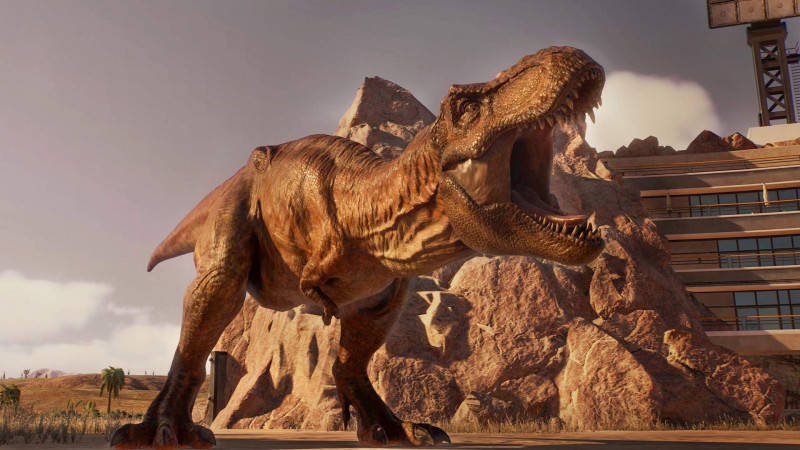
Dr. Wu is Jurassic World's Dr. Frankenstein – a mad scientist who creates new life by sewing together the DNA of different dinosaurs. His hybrids are more capable hunters, better suited to handle harsh climates, and are far more terrifying than the Tyrannosaurs rex. In Jurassic World Evolution 2, we see Frontier Developments taking a cue from Dr. Wu. The dinosaurs players interact with are more aware of their surroundings, can find their own food, and even learn to hunt in packs. The skeletal framework that brings this simulation to life is the same as its precursor, but everything around it is evolved or changed. These changes make for more dynamic and challenging play, but not always for the better.
Set after the events of Jurassic World: Fallen Kingdom, dinosaurs are now a part of the United States' ecosystem, and we're learning if we can live with them. The player works with the Department of Fish and Wildlife to deal with dinosaur issues, such as Pteranodons migrating too close to the Canadian border, or worse yet, hungry predators posing a threat to society. This setup provides an excellent variety in maps, from snow-colored fields and arid deserts to lush forests and sprawling lakes. The change in scenery adds an element of excitement and helps the experience feel somewhat new again.
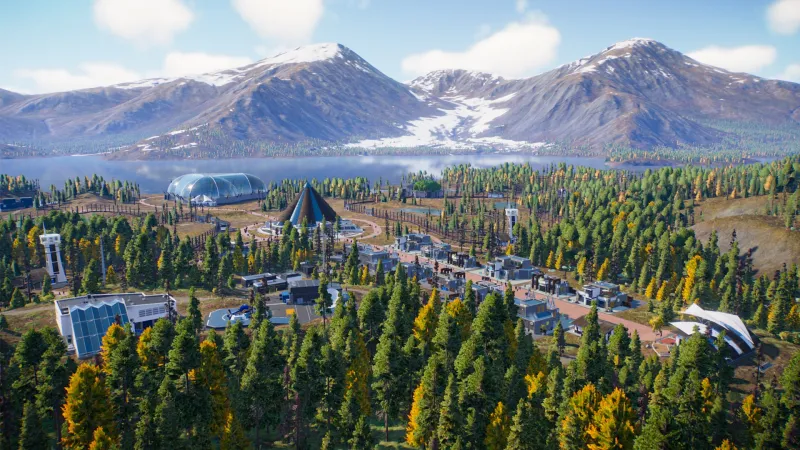
As wild as it is to see an Allosaurus running through the snow, this campaign experience lacks bite and comes across as a glorified tutorial that doesn't last long. I enjoyed the difficulty of Jurassic World Evolution 1's campaign and how it pushed the player to excel in theme park development to reach new islands. This campaign never goes in that direction and instead focuses too heavily on herding dinosaurs like cattle, much like the disappointing missions in Evolution 1's lackluster Claire's Sanctuary DLC. Hearing Ian Malcolm (voiced again by Jeff Goldblum) issue grave and sarcastic warnings about the future is good fun, but it's not enough to save the experience.
The fact that the campaign doesn't last long is a blessing in disguise as another mode takes the spotlight and truly embraces the park-building experience. This mode is called Chaos Theory, a fun "What if…?" exploration of all five Jurassic movies. You get the chance to rewrite history, beginning with John Hammond turning to you to help build the first Jurassic Park. All of these scenarios embrace the look and feel of the films, not to mention the dinosaurs. Playing through each mission is an excellent way of unlocking dinosaurs for other modes, including the new marine and flying types, which are fully fleshed out and fun to watch.
Click image thumbnails to view larger version

The dinosaurs are rightfully the stars of this experience. These thunder beasts are highly detailed, animated in fun ways (especially when on the hunt), and offer decent customization through cool-looking skins. They have a bit more life than the first game, and one of the best touches is how they find their comfort zones within an enclosure based on their food's location. You can now safely have a more comprehensive selection of dinosaurs in one enclosure, which reduces the need to clutter the park with fencing. This design is a nice touch that frees up room for other guest-related destinations.
The enhanced dinosaur realism also means you have to care for them more – which is a bit of a drawback. Each dino is a little fragile and can break bones, get gashed up, and force you to tranquilize and airlift them to the new medical facility. Making them more resilient through research is possible, but the early stages are rough in terms of dino care, especially given how much of a hassle park management is at this point.
Click here to watch embedded mediaQuality of life improvements accompany most of the park-building gameplay and menus. Players can now speed up time whenever they want, a change that removes the frustration of waiting for a meter to fill. Feeding electricity to structures is also much easier through the new generator, which powers everything around it and doesn't require powerlines. All creation aspects are tied to another excellent addition: scientists, who you manually hire and assign to tasks given their specialties. One scientist can speed up egg incubation, whereas another reduces the price of a fossil expedition. All of these elements sing together and make the game far better.
They also make it worse. That supposed hassle-free generator runs on fuel that you have to resupply frequently. The price for a full tank of gas can be over $400,000. If you have many generators (which you likely will), you'll need to ensure you have over a million banked for fuel. It's something you need to keep thinking about.
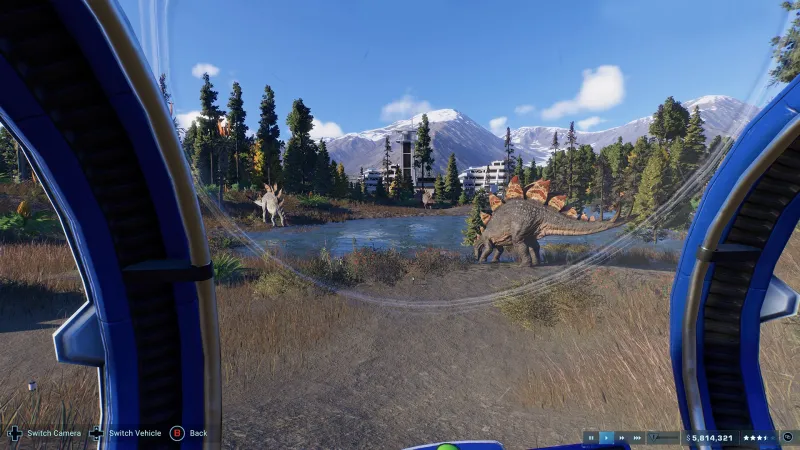
Those brilliant scientists grow tired and need to sleep often. Every time they hop in bed, it costs you $75,000. Additionally, when the more impressive dinosaur species are unlocked, such as the Tyrannosaur, the scientists you have on hand may not have the expertise to incubate them, which means you'll need to fire a few and find new help.
The micromanaging gets intense and can be outright annoying when a storm hits, and you suddenly have dinosaurs outside their enclosures, power outages, dinos with broken bones, and finances spinning into the toilet. Diseases also run rampant and can be headaches. Stretches of play can feel like you are plugging hole after hole. Making money to keep things afloat can be challenging, but weathering these issues leads to research options that reduce the frustrations. If you stick with it, the entire experience gets better with time.
For instance, the player can research energy enhancements, which, in a strange twist, are the classic power stations and power lines from the first game. It's almost like Frontier realized players would not like the generators and offered the old solution as a fallback. Other options include finding more dinosaur fossils, additional skill points for scientists (which is a game-changer), and more attractions for guests. You must earn most of these boosts by raising your park's star level.
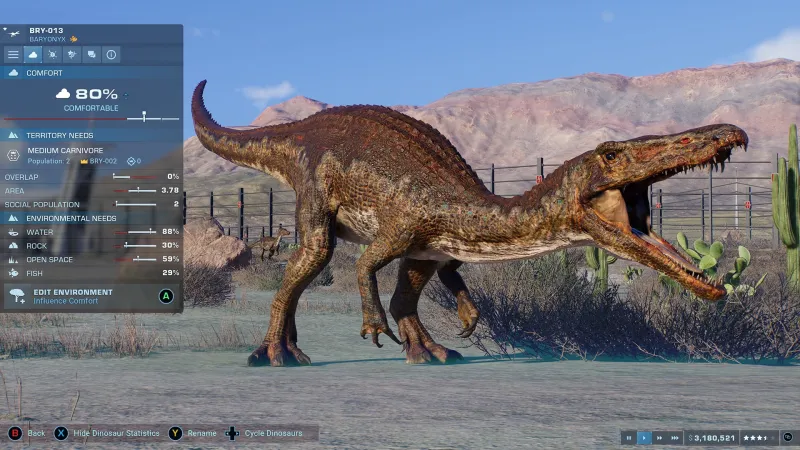
The park-building process is identical in terms of flow of play, yet it offers a higher degree of personalization. Each shop's exterior can be fully designed, right down to its architecture, coloring, and props. The surrounding area can also hold a variety of decorations, such as outdoor seating for a restaurant or fun dino-themed items like a giant skull. Each of these establishments offers a variety of interior attractions that lure in different types of guests. If you play your cards right, you'll make money hand over fist, but there will undoubtedly be frustrating stretches along the way.
Jurassic World Evolution 2 makes as many giant steps forward as it does back but has enough going for it to deliver a fun and rewarding theme-park experience. Like its predecessor, Sandbox Mode is the most fun, and this avenue of play combines everything the player has unlocked while removing all of the stresses. Collecting every dinosaur takes time and effort, but it's worthwhile, especially since you can experiment to see what happens when every dinosaur roams freely in the same space.
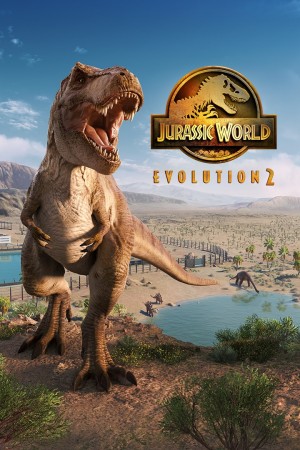
Score: 8
Summary: The sequel delivers more awe-inspiring dinosaurs, including marine and flying types, but still struggles with making park management fun.
Concept: Bigger but not always better, Jurassic World Evolution 2 offers more dinosaurs and park-building options that sometimes lead to headaches
Graphics: The dinosaurs look fantastic and offer a variety of new skins. The environments also look great, but some shadows pop in when the camera turns
Sound: The familiar Jurassic melodies blend beautifully with the frightening predator roars. Jeff Goldblum and Bryce Dallas Howard also reprise their movie roles
Playability: The building controls work well and allow for many things to be in motion at once. Not every new idea is successful. Power and employee management can be pains
Entertainment: This is a game that is worth struggling with to unlock new dinosaurs for the freeing sandbox mode
Replay: High
No comments:
Post a Comment